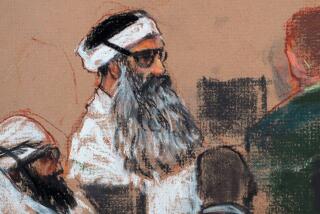Two Get Death Sentences in Attack on Cole
CAIRO — A Yemeni court Wednesday sentenced two Islamic militants to death by firing squad for helping suicide bombers who slammed an explosives-rigged motorboat into the side of the U.S. Navy destroyer Cole in October 2000.
A judge handed down prison terms to four others, all Yemenis, for forging documents, delivering money and planning to videotape the attack, which ripped a gaping hole in the side of the ship, killing 17 U.S. sailors.
Prosecutors said the two men sentenced to die, Jamal Mohammed Ahmad Ali Badawi, a 35-year-old Yemeni, and Abd al Rahim al Nashiri, a Saudi, bought the speedboat that was later packed with explosives and crashed into the side of the Cole while it refueled in the Yemeni port of Aden.
“God is great!” the men cried as their sentences were read aloud in a tightly guarded courtroom in Sana, the Yemeni capital. But Badawi lashed out at the decision.
“This verdict is an American one and unjust!” Badawi shouted from behind the bars in a courtroom cell, according to news service reports. “There are no human rights in the world, except for the Americans. All the Muslims in the world are being used to serve American interests.”
Five of the six defendants had complained of U.S. interference in the case and refused to enter pleas.
U.S. officials were in the courtroom throughout the trial, and lawyers for the accused men complained that the trials were delayed for years while U.S. agents finished their investigations.
“The evidence obtained by the court affirms the collaboration of the defendants in the case, ... which harmed the country, its reputation, and threatened its social stability and security,” Judge Najib Qaderi said before announcing the sentences.
Nashiri, a suspected senior Al Qaeda member portrayed by U.S. and Yemeni officials as a ringleader in the Cole attack, was the only defendant not in the courtroom. Captured in the United Arab Emirates, he is in the custody of the U.S. government, which announced his arrest in 2002 but has declined to say where he is being held.
Badawi’s father, also named Mohammed, told Associated Press that his son was sentenced to die “under heavy American pressure.”
“It is a ready-made verdict, and we will appeal,” the father said.
The Cole bombing was a watershed for Yemen. Since the attack, the government has stepped up cooperation with the United States, rounded up hundreds of militants and is struggling -- with mixed success -- to overcome its image as a haven for extremists.
Interviewed in Sana two weeks before the trial closed, a lawyer for the accused men said he was confident that none of them would be sentenced to die. “They don’t have evidence for that,” Abdul Aziz Samawi said.
Samawi caused a minor commotion midway though the trial when he presented the court with a permit signed by former Interior Minister Hussein Mohammed Arab.
The document ordered security forces to grant safe passage to Mohammed Omar Harazi. Harazi is one of the names used by Nashiri.
Some Yemeni officials have said the document is a forgery. But Samawi, who insists that it is authentic, said he submitted the letter to remind the judge that other Yemenis may have given aid -- perhaps unwittingly -- to the bombers.
Another prominent Yemeni lawyer, Mohammed Naji Allaw, had signed on to defend the Cole suspects, but said he dropped their case in disgust over American interference.
The trial was delayed as U.S. authorities carried out investigations, he said. And when the trial opened, the lawyers were unable to get a copy of the case file, which detailed the charges against their clients, Allaw said.
“I can’t help people unless I have the file,” he said.
“From what we know, the evidence is very weak,” he said. “But these cases are bigger than the judgment of the judges to say no.”
More to Read
Sign up for Essential California
The most important California stories and recommendations in your inbox every morning.
You may occasionally receive promotional content from the Los Angeles Times.










